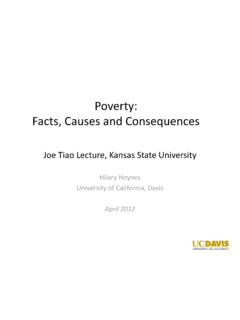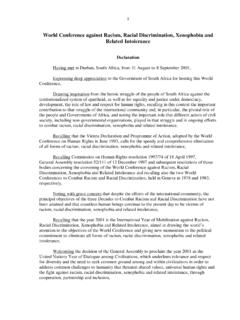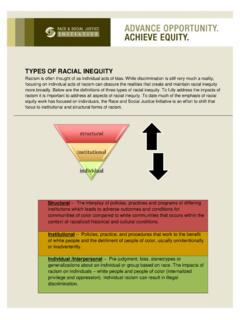Transcription of Racial Profiling
1 49131 Racial Profi ling POINT: Profiling is a legitimate practice if used correctly. It can be an effective and necessary tool for law enforcement. Peter H. Schuck, Yale University COUNTERPOINT: Racial profiling is a discriminatory practice that undermines fundamental civil rights while failing to promote law enforcement goals. Karin D. Martin and Jack Glaser, University of California, Berkeley Introduction The practice of Racial profiling, which involves singling out a person or persons for special (usually law-enforcement-related) attention based solely on their race or ethnicity, is part of a specific set of issues that the United States has grap-pled with in protecting the civil rights of minority individuals belonging to a specific group or class. The Fourth Amendment to the Constitution, protecting against unreasonable search and seizure, and the equal protection provisions of the Fourteenth Amendment make Racial profiling per se illegal.
2 But the legal community and law enforcement agencies have worked to define parameters that would allow consideration of race or ethnicity in conjunction with other behaviors or factors. Given its controversial nature, it is not surprising that definitions of Racial profiling vary. The Department of Justice, for example, defines it as any police-initiated action that relies on the race, ethnicity, or national origin rather than the behav-ior of an individual or information that leads the police to a particular individual who has been identified as being, or hav-ing been, engaged in criminal activity. Far more simply, the General Accounting Office defines it as using race as a key factor in deciding whether to make a traffic stop. The Office of the Arizona Attorney General, meanwhile, describes it as use by law enforcement personnel of an individual s race or ethnicity as a factor in articulating reasonable suspicion to stop, question or arrest an individual, unless race or ethnicity is part of an identifying description of a specific suspect for a specific crime.
3 The issue of Racial profiling has been brought into sharp focus in the immigration arena by passage of state laws such as Arizona s 1070. Although 1070 specifically forbids Racial profiling, critics have widely decried the law as impossible to enforce unless police engage in the practice. The central challenge is that, while the vast majority of illegal immigrants in Arizona are from Mexico and are Hispanics, not all Hispanics of Mexican origin are illegal immigrants. Thus, the probability that 1070 will result in discrimination by virtue of Racial profiling against Hispanics who are either citizens or foreign nationals legally in the country seems very high. As in all situations where Racial profiling is a concern, there is a power imbalance between law enforcement personnel, who are frequently members of the majority population, and the targets of that enforcement, who are by definition mem-bers of a minority population.
4 Proponents of legitimate Racial profiling argue that it provides law enforcement with a valuable tool. Opponents argue that it is counterproductive and is a fundamental violation of core American values of human rights and dignity. Copyright 2012 SAGE Publications. Not for sale, reproduction, or distribution. 492 Social and Cultural Debates: Responses to Illegal Immigration In the Point essay below, Peter Schuck argues that in the post-9/11 era, and with the issue of illegal immigration becoming more and more pressing, it is important for the country to have a rational discussion about the use of Racial profiling. Government may not treat individuals arbitrarily, he argues, it must base its action on information that is reli-able enough to justify its exercise of power over free individuals.
5 He goes on to say, context is everything, and when it is used properly and within defined legal parameters, Racial profiling can be a legitimate, useful tool of law enforcement. In the Counterpoint essay, Karin Martin and Jack Glaser contend there are serious social costs incurred both by the targets of Racial profiling and by the broader American society. They consider the effectiveness of Racial profiling, deter-mining that, in fact, the evidence shows that Racial profiling is both ineffective and inefficient. Finally, they argue that the demonstrated ineffective and unjust nature of Racial profiling demands that it be rejected, and that a proactive, enforce-able ban on its use be enacted. In reading this chapter, consider not only whether Racial profiling is effective, but also to what extent such a practice is valuable, given the rights to equal protection established by the Constitution.
6 How much safety can be bought through Racial profiling, and is the price acceptable? Conversely, given the high expectations placed on law enforcement, is it reasonable to expect that consideration of race and ethnicity not be a part of standard investigation techniques? Copyright 2012 SAGE Publications. Not for sale, reproduction, or distribution. Racial Profi ling 493 POINT Since the terrorist attacks of September 11, 2001, Racial profiling has become one of the hottest civil rights issues of the day whose prominence that has only been heightened by the subsequent passage of state laws designed to deter undocumented immigrants from entering or remaining in the state. The issue, however, deserves cooler reflection than it has received thus far. Politicians and pundits, regardless of ideology, reflexively denounce the practice, and nary a word is raised in its defense.
7 Some states have already barred any form of profiling, and it is possible that the Congress could follow suit. Yet, as Dr. Johnson said of the gallows, the events of 9/11 concentrate the mind wonderfully. The disaster that befell the United States on that day and those that, on a smaller scale have occurred elsewhere since then, and will probably do so in the future demands a profiling debate that is clear-eyed and hardheaded, not simplistic or demagogic. One must be clear about the state laws that opponents believe invite profiling. In the case of Arizona s controversial statute (and some or all of the other similar state laws), the law specifically prohibits consideration of race, color, or national origin in its enforcement. Indeed, Arizona s governor, Jan Brewer, signed an executive order directing that law enforcement officials be trained to avoid illegal Racial profiling.
8 Further, the law expressly prohibits officials from making stops and arrests when race is the only basis for doing so. A lawful reason for the initial stop must exist other than the suspected immigration status of the detained person. Indeed, the law tracks the 2003 memorandum issued by the Department of Justice banning Racial profiling in federal law enforcement. Therefore, the Racial profiling argument against such laws serves only to prevent rational discussion of a screening practice that, when used properly and within defined legal parameters, can be a legitimate, effective tool of law enforcement. There are legitimate reasons to criticize the Arizona legislation, but the false assertion that the law permits Racial or ethnic profiling is not one of them. context IS EVERYTHING The furor over Racial profiling is easy to understand.
9 Harassment of those who, as the sayings go, drive while Black or fly while Arab, are emblems of the indignities that law enforcement officials are said to inflict on minorities on the basis of demeaning stereotypes and Racial prejudice. This is no laughing matter. The state s coercive power creates special responsibilities for law enforcement officials to screen only in accordance with legal guidelines. Respect for the rule of law means that people must not be singled out for enforcement scrutiny simply because of their race or ethnicity. Or does it? Much turns on the meaning of simply in that sentence. Profiling is not only inevitable, it is in fact sensible public policy under certain conditions and with appropriate safeguards against abuse. After September 11, the stakes in deciding when and how profiling may be used and how to remedy abuses when they occur could not be higher.
10 A fruitful debate on profiling properly begins with the core values of American society. The most important of these, of course, is national defense, without which no other values can be realized. But one should be wary of claims that ideals must be sacrificed in the name of national security; this means that other ideals remain central to the inquiry. The ideal most threatened by profiling is the principle that all individuals are equal before the law. In most but not all respects, the same entitlements are extended to aliens who are present in the polity, whether they are here legally or illegally. Differential treatment must meet a burden of justification and in the case of Racial classification, a very high one. This ideal has a corollary: government may not treat individuals arbitrarily.











